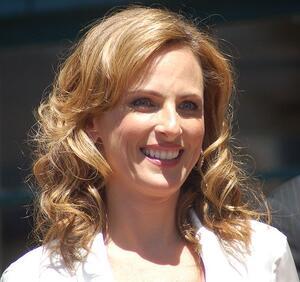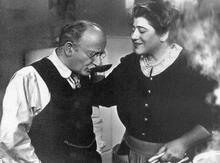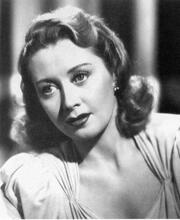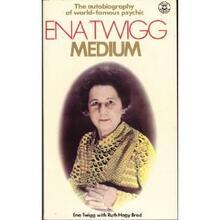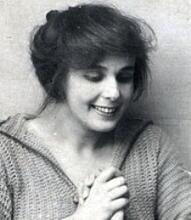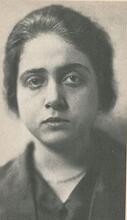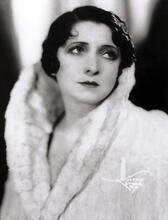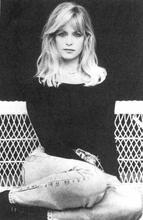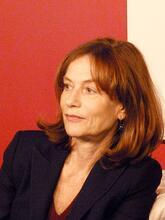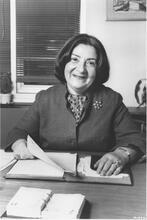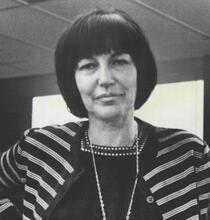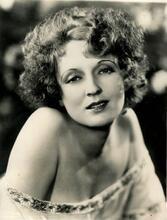Marlee Matlin
Matlee Matlin receiving a Hollywood Walk of Fame Star in May 2009.
Courtesy of Angela George/Wikimedia Commons.
Marlee Matlin is arguably Hollywood’s most famous Deaf celebrity. Her prolific career began with a critically acclaimed, Oscar-winning performance in Children of a Lesser God in 1986, a role that launched her to stardom even as she struggled against ableism in Hollywood and pushback from both the Deaf and hearing communities. In addition to her film career, including her appearance in 2021’s Best Picture winner, CODA, Matlin has appeared in a number of supporting and guest roles on television, including Emmy-nominated turns on Seinfeld, Picket Fences, The Practice, and Law & Order: SVU, as well as featured roles on The West Wing, Switched at Birth, and The L Word. Her activist work has led to the widespread closed captioning of American television for Deaf and hard-of-hearing audiences.
Early Life and Family
Marlee Matlin was born “screaming” on August 24, 1965, as she describes in her 2009 memoir, aptly entitled I’ll Scream Later. The youngest child and only daughter of Don and Libby (Hammer) Matlin, she grew up in the Morton Grove suburb of Chicago, an upper-middle-class neighborhood far removed from the modest immigrant origins of her grandparents, all of whom arrived in the United States from Eastern Europe in the 1910s and 1920s. She has two older brothers, Eric and Marc. Matlin’s unique first name came indirectly from her maternal grandmother, Rose, who asked that her granddaughter be named for Molly, Rose’s half-sister who had helped bring Rose and her two oldest children to the United States from Poland. Matlin’s mother, who “despised” her aunt Molly, accepted this request, but with a twist: after attending a luncheon featuring an engaging speaker named Marlee, Matlin’s mother decided that the name was close enough to “Molly” to satisfy Rose’s wishes.
At eighteen months, Matlin lost her hearing; as she describes in her memoir, “everything just stopped.” During a trip to visit relatives in California, a neighbor of Matlin’s grandmother told the Matlins that she was sure that Marlee, unresponsive to both sounds and speech, was Deaf. While her parents initially dismissed the neighbor’s concerns and assumed their daughter was just a “stubborn” toddler, it soon became apparent that Matlin no longer could hear. For the majority of her life, Matlin believed that her deafness was the result of a case of roseola, a common viral infection in infants and toddlers that can cause high fever and a rash. A later diagnosis revealed that Matlin has a genetically malformed cochlea, meaning that while she could likely hear when she was born, her hearing would have receded over the first two years of her life even without her bout of roseola. Since she was eighteen months old, Matlin has had absolutely no hearing in one ear and roughly 20 percent hearing in the other.
Matlin credits her parents for their decision to have her grow up at home and attend mainstream schools, rather than following the advice of her doctors and sending her to a school for the deaf hundreds of miles away. Matlin began taking speech lessons at three and American Sign Language (ASL) lessons at five. Her earliest memories, as she describes in her memoir, “are of moving constantly between the [hearing and Deaf worlds].” While her lipreading and speech lessons were “extremely difficult,” Matlin grew to recognize the importance of being able to speak as well as possible. ASL lessons, on the other hand, proved more transformative, as “communication and meaning flowed back into [Matlin’s] life at full force.”
Jewish Identity
Matlin’s Jewish identity held great significance in her early life as she continued to find ways to bridge the gaps between the hearing and Deaf worlds. As she told the Jewish News of Northern California in 2006, “I wouldn’t be who I am if I weren’t Jewish.” Matlin attributes her “can-do attitude,” her intensity, and her “relentless need to break through and connect” to her Jewish heritage. The Matlin family attended B’nai Shalom, a Reform synagogue in nearby Skokie, IL, that catered to both hearing and Deaf congregants, allowing the young Matlin to explore her Jewishness in an accessible and welcoming setting.
Matlin studied Torah for two to three years with her rabbi, who both signed and spoke, to prepare for her Lit. "daughter of the commandment." A girl who has reached legal-religious maturity and is now obligated to fulfill the commandmentsbat mitzvah, a pivotal event her life that, as she told The Forward in 2015, “gave me the drive…the foundation to believe in myself, despite what other people say.” Matlin spoke the Hebrew sections of the service and signed her d’var Torah in English, and her successful reading of her Torah portion elicited tears from her parents, brothers, and other relatives. As Matlin recalls, seeing her family cry made her cry as well, and when she apologized to her rabbi for allowing her tears to fall on the Torah, he told her that “our history is stained by tears. Your tears are a wonderful mitzvah.”
Childhood Performances and Discovery by Henry Winkler
When Matlin was seven, her parents began sending her to the Center on Deafness and the Arts, a Chicago-based institution founded by Dr. Patricia Scherer that offered after-school and weekend arts programs for Deaf, hard-of-hearing, and hearing children. Scherer noticed Matlin’s natural affinity for acting and love for music, encouraging her to perform with hearing children as a member of the Traveling Hands Troupe (where she signed songs that hearing members of the group sang). She also cast Matlin as Dorothy in a production of The Wizard of Oz in the summer of 1972, giving her the chance to develop the story using both speech and signing.
Matlin’s experience at the Center on Deafness and the Arts proved an important turning point in her life. In her memoir, she describes her visceral response to acting and performing:
I remember standing on stage, signing as the others sang, feeling the vibrations of the music rumbling up through the floor under my feet and up through my body as I moved to the beat. I remember the audience, the faces smiling at me, watching, the hands applauding. I loved it. I felt at home and knew I wanted to have this feeling again. I was hooked.
When she was twelve, Matlin met actor Henry Winkler while performing with the Traveling Hands Troupe at the Center of Deafness and the Arts’ annual Creative Arts Festival. The meeting changed Matlin’s life. Upon seeing Matlin perform the song “Free to Be You and Me,” Winkler was struck by how “powerful” her performance was: “this human being, whether she could hear or not, was born to do this. Her power, her commitment, her ability, that intangible whatever it is that makes a star, was radiating off her like heat waves.” Winker and his wife, Stacey, sought Matlin out backstage, where Winkler encouraged Matlin to follow her acting dreams, despite her mother’s reservations. He became a lifelong mentor and father figure as Matlin came of age and began to pursue a career in Hollywood.
Children of a Lesser God, Struggles with Addiction, and Hollywood Stardom
In 1985, Matlin got her first professional acting job—a small role in the Chicago stage production of Mark Medoff’s Tony Award-winning play Children of a Lesser God. A local agent sent a recording of the production to director Randa Haines, who was in the process of adapting the play into a film starring Oscar-winner William Hurt as an unorthodox speech pathologist who teaches at a school for Deaf children. Haines was struck by Matlin’s stage performance and brought her to New York for a screen test with Hurt. At nineteen, Matlin was ultimately cast in the leading role as Sarah Norman, the angry and isolated school custodian who refuses to lip-read or speak, even as she embarks on a romantic relationship with Hurt’s character. Matlin’s performance—powerful, expressive, and charismatic—earned immediate attention both from the film industry and from critics. In 1987, at just 21, Matlin won the Golden Globe for Best Actress in a Drama and the Oscar for Best Actress. She remains the youngest woman to take home the Oscar for Best Actress, and, until Troy Kotsur’s Best Supporting Actor win at the 2022 Oscars for his performance in CODA, she was the only Deaf performer ever to win an Academy Award.
Still, this period of Matlin’s life was tumultuous at best, even as she skyrocketed to stardom. Her drug use, particularly the addiction to cocaine and marijuana that began in her teens, was worsening. In February 1987, just days after her Golden Globe win for Children of a Lesser God, she checked herself into the Betty Ford Clinic. She spent 26 days in rehab (finding out that she was nominated for an Oscar while there), a difficult but important step in her journey towards sobriety. She has been sober ever since.
Matlin’s two-year, on-again, off-again romantic relationship with co-star William Hurt was difficult as well. The two began dating during the filming of Children of a Lesser God and the relationship devolved into emotional—and in at least one significant instance sexual—abuse, exacerbated by Hurt’s seeming inability to cope with Matlin’s burgeoning success. Hurt was particularly unsupportive during the 1987 awards season, during which he dismissed Matlin’s Oscar win as undeserved. (Hurt himself was nominated for his performance but lost to Paul Newman for The Color of Money.)
As she gained fame, Matlin received criticism from both the hearing and Deaf communities. Film critic Rex Reed notoriously disparaged Matlin’s Oscar win as a “pity vote.” And when Matlin returned to the Academy Awards in 1988 to present the award for Best Actor and chose to speak the names of the nominees rather than sign them, she received backlash from members of the Deaf community, who thought she was sending the message that Deaf children should not use ASL.
Matlin persisted during this period of instability and increasing fame by maintaining a close-knit support system. During the promotion of Children of a Lesser God, she was introduced to Jack Jason, then a graduate student in film at New York University, who became her lifelong ASL interpreter and friend, and, eventually, the head of her production company, Solo One Productions. She also leaned on Henry and Stacey Winkler, living with them for two years after her Oscar win and the end of her relationship with Hurt.
Matlin’s career continued to flourish, and her presence in Hollywood expanded the roles that Deaf actors could play on both film and television, in both speaking and signing parts. She sought out roles that allowed her to dedicate herself to causes that mattered to her—for example, her role in 1996’s It’s My Party, one of the first feature films to explore the topic of AIDS victims dying with dignity, was spurred by her support of the Elizabeth Glaser Pediatric AIDS Foundation. She also pursued opportunities that she thought would inspire Deaf children, appearing as herself on Sesame Street in 1988 with Billy Joel to sign “Just The Way You Are,” or signing the National Anthem at the Super Bowl in 1993 and 2007, for instance. Flourishing in both comedy and drama, Matlin’s television’s career boasts an impressive number of guest and recurring roles on hit series such as Seinfeld, The West Wing, Picket Fences, Spin City, ER, Law & Order: Special Victims Unit, Desperate Housewives, and The L Word, where she played the Deaf, lesbian, Jewish artist Jodi Lerner. Matlin has been nominated for four Prime-time Emmy awards for her work on television.
In 2008, Matlin became the first-ever Deaf participant on ABC’s Dancing with the Stars, making it through six weeks of competition by using what she called an “internal metronome.” She also appeared on Broadway in a history-making production of the Tony-winning rock musical Spring Awakening in 2015, featuring a cast of Deaf actors signing their lines and songs.
Marriage and Family
While working on the set of Reasonable Doubts, the police drama co-starring Matlin and Mark Harmon that ran on NBC from 1991 to 1993, Matlin met Kevin Grandalski, a Burbank, CA, police officer. In February 1993, they became engaged; they were married on August 29, 1993, by a priest and a rabbi at a private ceremony and reception for family and friends at the Toluca Lake, CA, home of Henry and Stacey Winkler. Matlin and Grandalski have four children, Sarah (b. 1996), Brandon (b. 2000), Tyler (b. 2002), and Isabelle (b. 2003). As Matlin told the Oregon Jewish Life in 2018, their household is interfaith, and the family celebrates both Jewish and Christian holidays.
Deaf Activism, Philanthropy, and Writing
Since the beginning of her career, Matlin has been a dedicated champion for the rights of the Deaf and disabled communities. She is particularly passionate about closed captioning for film and television, a cause that stems from her own experiences during childhood, when she either had to depend on family to explain what was happening on television or gravitate towards genres she could follow on her own, such as sports, action stories, and westerns. After needing her mother to translate a speech from then-President Gerald Ford in the aftermath of the Watergate scandal in 1974, Matlin wrote a letter to the President asking why television could not be made so that she could understand it. Seeing Three’s Company—the first prime time series to include closed captioning—premiere in 1977 changed Matlin’s world.
Still, closed captioning was far from universal. The first closed-captioned home videos were not available until 1981, and Children of a Lesser God became the first English-language film to offer a limited number of captioned screenings when the film was first released in 1986. Using the celebrity she earned from her performance as Sarah Norman, Matlin became the spokesperson for the National Captioning Institute in 1987, recruiting fellow members of the Hollywood elite to support her cause and championing closed captioning in the media. The same year, she received an honorary doctorate of humane letters from Gallaudet University, a research university for the Deaf and hard-of-hearing in Washington, D.C., for her work on behalf of the Deaf community, an honor she considers as gratifying as her Oscar. In 1990, Matlin met with then-First Lady Barbara Bush and appealed directly to Congress regarding the importance of closed-captioned television. Her testimony led to the passage of the Television Decoder Circuitry Act of 1990, requiring American television sets to come equipped with closed-captioning technology. Home videos, and eventually DVDs, soon followed.
In addition to her closed-captioning work, Matlin has her own ASL app, Marlee Signs, which provides ASL education to students of all levels. She has also written a number of children’s books—including Deaf Child Crossing (2002), Nobody’s Perfect (2006), and Leading Ladies (2007)—based loosely on her own upbringing and aimed at helping Deaf and hearing children learn how to deal with feeling different and interacting with friends, neighbors, and bullies.
Matlin has been recognized in the Jewish community for her activism and philanthropic work as well. She visited Israel for the first time in 2017 to receive the Morton E. Ruderman Award in Inclusion for her work on behalf of people with disabilities in Hollywood. She has also spoken at events for the Jewish National Fund and Hadassah (of which she is a life member) about the importance of diversity and inclusion for Israel’s Deaf and disabled populations, and the strides Israel has made in integrating its Deaf citizens into the fabric of Israeli culture, including within the Israeli military.
CODA and Continued Strides for Deaf Performers
Matlin’s role in CODA—Sian Heder’s 2021 coming-of-age film about Ruby (Emilia Jones), a child of deaf adults (CODA) who has to balance her desire to help her family’s struggling fishing business and her dreams of becoming a singer—demonstrates just how far Hollywood has come since Children of a Lesser God, and how far it still has to go. Matlin plays Ruby’s overprotective but loving mother, Jackie.
The film has made history: not only was it the first streaming film (from Apple TV+) to win Best Picture at the Academy Awards, but the film’s cast became the first predominantly Deaf cast to win Best Ensemble in a Feature Film at the Screen Actors Guild (SAG) Awards, the most prestigious award offered at that event. Troy Kotsur, who plays Ruby’s father, the fun-loving and affectionate fisherman Frank, became only the second Deaf actor to win an Oscar for his performance, 35 years after Matlin won her Oscar in 1987. In a 2022 interview on The Drew Barrymore Show, Kotsur, who has been Deaf since infancy, recalled watching Matlin’s Oscars speech as a high schooler and credited Matlin with inspiring him and giving him the hope he needed to pursue acting.
For Matlin, the project was one of both passion and necessity. When first approached about the film and told that the roles of Frank and Leo, Ruby’s Deaf older brother, were going to be played by hearing actors, Matlin threatened not to participate. Kotsur and Daniel Durant, a Deaf actor and one of Matlin’s co-stars from the Freeform series Switched At Birth, were eventually cast instead. As she told Ben Mankiewicz during a 2021 interview for CBS Sunday Morning, “playing deaf is not a costume. We, deaf people, live it.” CODA proves that Deaf actors can carry films and series without being relegated to small, supporting roles or being stereotyped. It also showcases the richness of Deaf culture. CODA’s success, as well as the projects Matlin continues to develop on her own through her production company, reflects her desire to share that culture with more widespread audiences, and to see Hollywood become a more diverse, inclusive, and welcoming space for the myriad of Deaf stories that have yet to be told.
Apel, Laura. “Yes She Can: Marlee Matlin Tells Her Story.” Exceptional Parent Magazine, April 2009: 40-42.
Blomquist, Mala. “Marlee Matlin: Breaking Barriers and Following Her Dreams.” Oregon Jewish Life, October 2, 2018. https://orjewishlife.com/marlee-matlin-breaking-barriers-and-following-….
Chessler, Suzanne. “Actress/Activist Marlee Matlin will Headline Hadassah’s Annual Meeting.” The Detroit Jewish News, September 27, 2021. https://thejewishnews.com/2021/09/27/actress-activist-marlee-matlin-wil….
“‘CODA’ actress Marlee Matlin on making noise.” Interview with Ben Mankiewicz. CBS Sunday Morning, August 15, 2021. https://www.cbs.com/shows/video/fZwMGCFMZE7FPNHYZQGCINSWc1X5hqr9/.
“CODA’s Troy Kotsur Tells Marlee Matlin That Her 1987 Oscar Win Gave Him Hope as an Actor.” Interview with Drew Barrymore. The Drew Barrymore Show, March 22, 2022. https://www.thedrewbarrymoreshow.com/videos/codas-troy-kotsur-tells-mar….
Gelt, Jessica. “Marlee Matlin sees Deaf culture flowing into the Hollywood mainstream. ‘Keep making it happen.’” Los Angeles Times, March 30, 2022. https://www.latimes.com/entertainment-arts/story/2022-03-28/marlee-matl….
Matlin, Marlee (with Betsy Sharkey). I’ll Scream Later. New York: Simon Spotlight Entertainment, 2009.
Matlin, Marlee. “Marlee Matlin Official Website.” https://www.marleematlin.net/.
Schleier, Curt. “Marlee Matlin Explains How Her Bat Mitzvah Led to Her Oscar.” The Forward, October 20, 2015. https://forward.com/life/322928/marlee-matlin/.
Schleier, Curt. “No challenge goes unmet for deaf actress Marlee Matlin.” The Jewish News of Northern California, January 19, 2007. https://jweekly.com/2007/01/19/no-challenge-goes-unmet-for-deaf-actress….
Wall, Alix. “Jewish roots helped JCF speaker Marlee Matlin find her voice in film, TV.” The Jewish News of Northern California, January 27, 2006. https://jweekly.com/2006/01/27/jewish-roots-helped-jcf-speaker-marlee-m….

